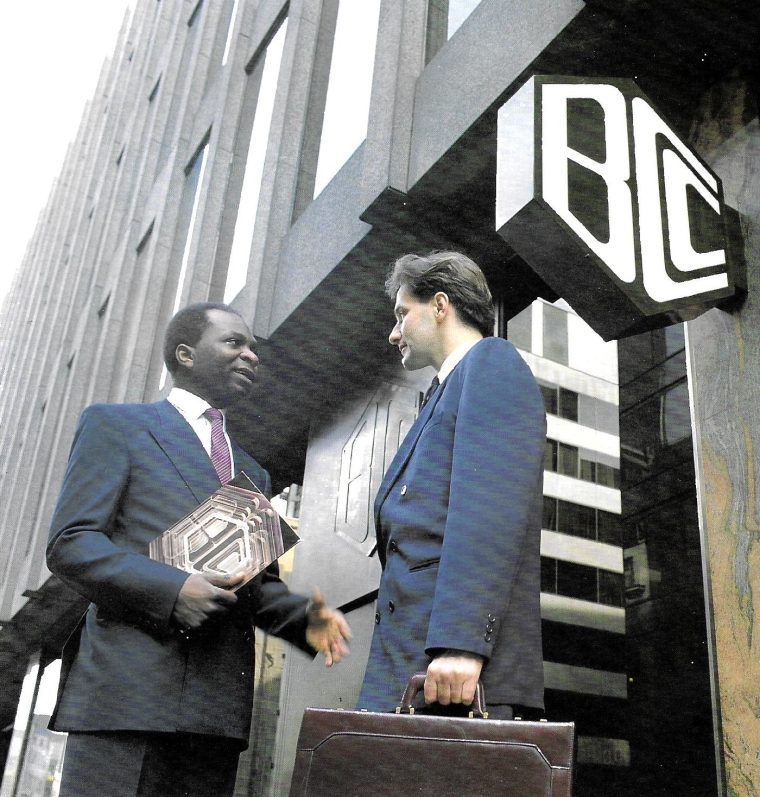
The abrupt closure of Bank of Credit and Commerce International (BCCI) in 1991 is considered by a silent majority in the Third World as a deliberately engineered and politically motivated move by vested interests in the West, to put an end to what was emerging as a leading bank on the global scene managed by bankers from former colonies.
Contrary to the narrative widely publicised referring to BCCI as a "collapsed bank", and thousands of depositors having lost heavily when BCCI was abruptly shut down in 1991 amid accusations of money laundering and fraud, the depositors received back all or over 95% of their monies. In the case of Hong Kong, the depositors received back more than 100% and in some other cases the bank's branches were taken over and continued to operate successfully.
Top western banks reported to have allowed "criminals to launder money and involved in the fraud" have not been shut down.
The lawyers and accountants involved with the world-wide liquidation ran up huge fees reportedly US$1.7 billion which have not been questioned.

Agha Hasan Abedi, the founder President, led BCCI from a two-room enterprise in London, United Kingdom to establishing a successful operation in only 19 years with strong presence in 73 countries at its peak. This was not possible without the dedication of thousands of BCCI employees providing excellence of service a million active customers. BCCI raised the profile of financing foreign trade and groomed young Third World citizens to gain confidence and play their role in international banking transactions dominated by banks from the West. If banking was Mr Abedi's profession, philanthropy was his passion along with his desire to improve the economic well-being of the indebted developing countries in the Third World.
Report of Lord Justice Bingham on Supervision of BCCI, 22 October 1992
Lord Justice Bingham was appointed by the Bank of England and the UK government's Treasury to investigate the manner in which BCCI had been supervised. On allegations of fraud and other worldwide incidents, the findings in the Report were primarily based on information gathered by the Bingham Inquiry Unit (BIU).
On the supervision of the BCCI in UK by the Bank of England (the Bank), in paragraph 33 (2.285) the Report concluded, "In its supervision of the UK region the Bank encountered nothing to cause serious concern".
The BCCI Affair: A Report to the Committee on Foreign Relations US Senate, December 1992
Mr Abedi and BCCI were charged with many unsubstantiated accusations set out in THE BCCI AFFAIR - EXECUTIVE SUMMARY in A Report to the Committee on Foreign Relations, United States Senate by Senator John Kerry and Senator Hank Brown, December 1992, also referred to as the Senator Kerry Report.
In particular, the Report highlighted:
"BCCI's unique criminal structure - an elaborate corporate spider-web with BCCI's founder, Agha Hasan Abedi and his assistant, Swaleh Naqvi, in the middle -- was an essential component of its spectacular growth, and a guarantee of its eventual collapse."
"BCCI's criminality included fraud by BCCI and BCCI customers involving billions of dollars; money laundering in Europe, Africa, Asia, and the Americas; BCCI's bribery of officials in most of those locations; support of terrorism, arms trafficking, and the sale of nuclear technologies; management of prostitution; the commission and facilitation of income tax evasion, smuggling, and illegal immigration; illicit purchases of banks and real estate; and a panoply of financial crimes limited only by the imagination of its officers and customers."
"Among BCCI's principal mechanisms for committing crimes were its use of shell corporations and bank confidentiality and secrecy havens; layering of its corporate structure; its use of front-men and nominees, guarantees and buy-back arrangements; back-to-back financial documentation among BCCI controlled entities, kick-backs and bribes, the intimidation of witnesses, and the retention of well-placed insiders to discourage governmental action."
Words of Mass Deception or Words of Mass Distraction
It would be pertinent to consider the illusion created especially by President George Bush of USA and Prime Minister Tony Blair of UK and justify the war on Iraq in 2003 destroy the weapons of mass destruction (WMD) when none were reportedly held by Iraq's President Saddam Hussein at the time of the invasion and while Iraq was under sanctions.
The article published in the Guardian newspaper on 7 October 2004 referred to the findings in the report of UN and US inspectors who spent two years searching 1,700 sites at a cost of more than $1bn that starkly contradicted the pre-war claim made by George Bush on weapons of mass destruction in Iraq, and Tony Blair's headline-grabbing claim based on mere hearsay that Iraq could deploy weapons of mass destruction within 45 minutes of an order by Saddam Hussein to do so.
The report, the culmination of an intensive 15-month search by 1,200 inspectors from the CIA's Iraq Survey Group (ISG), concluded that Saddam Hussein had ambitions to only restart at least chemical and nuclear programmes once sanctions were lifted. Concrete plans do not appear to have been laid down, let alone set in motion. Nor did Saddam issue direct verbal orders to develop weapons of mass destruction (WMD). The main evidence of his intentions are his own cryptic remarks, and the meaning his aides inferred from them.
The BCCI Affair report to sell the closure of BCC to the public might be comparable to words of mass deception (WMD) and efforts to curtail the aspirations of future third world bankers to attain an influentialposition in the global banking system with major international banks from western nations.
Ignoring achievements Muslims and Third World contributes to inaccurate depictions and negative representation.
The Senator Kerry Report omitted to mention that the founder of BCCI was a Muslim from the Third World as was his assistant Swaleh Naqvi and as were many of the other senior colleagues managing BCC from inception. And most of the bankers and employees also represented the third world. All were vilified.
The narrative promoted by the West has been to hold the view that in comparison to them the Muslims and the Third World are backward with Muslims having little to offer but fundamentalism and terrorism.
Books and feature articles published in the media after BCC closure simply repeated the same information in The BCCI Affair report. It did not appear that the authors made attempts or efforts to independently corroborate the statements made about the allegation that the culture in BCC was criminal from top to bottom, other than sensational presentation of the scandal to arouse intense interest, curiosity, or emotion among the ignorant public.
One must not overlook the words of mass deception (WMD) by the USA and UK in particular to justify the war on Iraq in 2003.
Omissions and Irregularities in BCC
It cannot be denied that there were serious omissions and irregularities in BCCI found even in many western financial institutions, but whether it warranted the closure of BCCI is questionable given the favourable treatment that major banks in the West by their regulators and governments. None were totally shut down and placed in liquidation.
The key allegations set out in THE BCCI AFFAIR are considered in the section Report to the Committee on Foreign Relation US Senate in relation to events that transpired with one or more perspectives about BCC's global dealings, pioneering initiatives, and remarkable success.